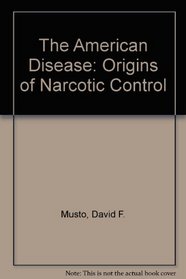Search -
The American Disease: Origins of Narcotic Control (Oxford Paperbacks)
The American Disease Origins of Narcotic Control - Oxford Paperbacks
Author:
Today's campaign to "crack down on crack" and the controversy surrounding mandatory drug-testing make the coverage of narcotics control in The American Disease timely and important. A classic study of the development of drug laws in the U.S., the book examines the relations between public outcry and the creation of prohibitive drug law... more »
Author:
Today's campaign to "crack down on crack" and the controversy surrounding mandatory drug-testing make the coverage of narcotics control in The American Disease timely and important. A classic study of the development of drug laws in the U.S., the book examines the relations between public outcry and the creation of prohibitive drug law... more »
ISBN-13: 9780195052114
ISBN-10: 0195052110
Publication Date: 1/14/1988
Pages: 400
Edition: Exp/Rep
Rating: ?
ISBN-10: 0195052110
Publication Date: 1/14/1988
Pages: 400
Edition: Exp/Rep
Rating: ?
0 stars, based on 0 rating
Publisher: Oxford University Press, USA
Book Type: Paperback
Members Wishing: 1
Reviews: Amazon | Write a Review
Book Type: Paperback
Members Wishing: 1
Reviews: Amazon | Write a Review
Genres:
- History >> Americas >> United States >> General
- Politics & Social Sciences >> Government >> Social Policy




